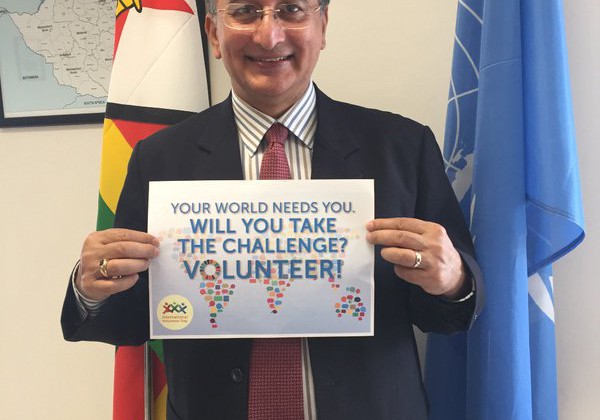Achieving SDGs Requires Strong, Rational Implementation
OPINION By Bishow Parajuli
UN country co-ordinator
On October 24, we celebrated the 71st anniversary of the United Nations together with over 300 partners including Government ministers, UN heads of agencies, ambassadors, heads of NGOs, the media, civil society organisations, traditional leaders, representatives of private sector and young people in a truly global spirit.
The day allowed taking stock of our year-long engagement in the development and humanitarian spheres in Zimbabwe. During the course of 2016, a broad-based national coalition for Sustainable Development Goals (SDGs) was established.
Parliamentarians have taken the lead in legislating for SDGs friendly laws, and Local Government (Provincial and District Level) have committed to actively participate in the implementation of SDGs programmes on the ground.
Young people in schools, universities, and in their associations have been playing their role in SDGs advocacy online and offline, whilst on the other hand traditional leaders have started mobilising communities into action. The media has long been on board setting the agenda of public discourse for a meaningful and objective dialogue on SDGs.
Going forward, we need to increase the momentum on our commitment that “no one is left behind” in the quest to end poverty, hunger and protect the planet, as well as fulfilling the aspirations of SDG 16 — ensuring peace, justice and strong institutions for all. For all this implementation will be key.
Such commitment to action on SDGs was recently reiterated by President Mugabe at the UN General Assembly, where he emphasised that there should be no half measures and no compromises in achieving all the 17 Goals.
In line with this commitment, in the first year of the 2016-2020 Zimbabwe UN Development Assistance Framework (ZUNDAF) implementation, the UN has been on target in development programme support, except some areas such as poverty reduction that require additional resources.
I am glad to note that emphasis has been put in this area and the Government has recently launched its Interim Poverty Reduction Strategy for the period of 2016-2018 that will guide national efforts to reduce poverty.
The ZUNDAF prioritises the UN’s support in areas of food and nutrition security, gender equality, HIV and AIDS, poverty reduction and value addition, public administration and governance, and social services and protection.
For example, in partnership with the development partners and the Global Funds, the programme on HIV and AIDS is currently providing treatment to 915 000 Zimbabweans, resulting in steady reduction of prevalence rate. The programme on reproductive, maternal, neonatal, child and adolescent health helped Zimbabwe to reduce the maternal mortality by 50 percent in the last 5 years.
The UN continues to support the advancement of human rights and rule of law, including through the Universal Periodic Review process and capacitating independent national bodies, such as the Human Rights Commission, Gender Commission, National healing, Peace and Reconciliation Commission, and the Zimbabwe Electoral Commission.
The UN is committed to do more in supporting and strengthening these independent national watchdogs and various other development, human rights and democratic institutions
In our collective response to the prevailing drought situation, under the leadership of the Government, the UN and NGOs, together with donors such as the USA, UK, China, EU, Netherlands, Japan — to name but a few — have demonstrated strong solidarity in alleviating the threat of hunger.
Of the total $352 million appeal made for the period April 2016 to March 2017, with generous support from donors to the tune of $206 million, the UN and NGOs have reached 1.5 million people who are most in need.
The response is expected to reach 3.1 million people at the peak of the lean season. Our assistance is targeted to the most vulnerable communities in line with the universal humanitarian principles of humanity, neutrality, independence and impartiality.
The world over, including in Zimbabwe, the lines between humanitarian and development needs are becoming increasingly blurred by the effects of climate change.
In order to counter and mitigate the high incidences of recurrent drought in Zimbabwe, we need to invest in tackling its root causes through agricultural reform, irrigation, water harvesting and management for longer term impact.
Over the years it has been demonstrated that traditional development cooperation is not enough to achieve sustainable development. In this regard, a three points can be emphasised that could further accelerate transformation and sustainable development:
First, continued effort to promote reform and establish right policy environment premised on rule of law and respect for human rights — rem




